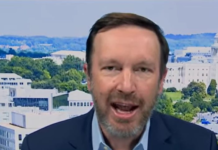Rep. Liz Cheney (R-WY) has been lauded by Democrats and anti-Trump Republicans alike for the stand she has taken against Trump’s “Big Lie†and for her refusal to deny, as so many Republicans do, that the January 6 assault on the Capitol was anything less than a well-organized and orchestrated criminal and violent insurrection spurred by Trump himself with the help of his usual operatives.
Without a doubt, in taking this stand, she has earned the disfavor of the current congressional Republicans who have effectively marginalized her as a political persona non grata in the party.
And she has played this martyrdom for all it’s worth, going all out in her efforts to paint Trump as the criminal he is.
It is useful to pause and reflect on what the end game of Cheney’s martyrdom might be. We should hardly be willing to see her “principled†stand as an act of political suicide.
It may well be she’s making the political calculation that the Party of Trump will be short-lived and that her martyrdom may elevate her if and when that “mainstream†Republican Party experiences a resurrection.
Knowing the machinations of her father, it may well be she has plans on seeking the presidency and is using this aggressive anti-Trump platform she’s constructed to pose herself as the exemplar of bi-partisansh across-the-aisle politics and the defender of democracy.
After all, just look at her sitting up on the dais with Democrats, executing the mission of the 1/6 commission. Who could be less partisan? Who could be more concerned about the survival of American democracy?
Just the other day, in fact, Cheney issued the powerful statement: “We can either be loyal to Donald Trump or we can be loyal to the Constitution, but we cannot be both.â€
Of course, pretending fidelity to the Constitution does not automatically make one a supporter of democracy.
Indeed, Antonin Scalia, former Supreme Court Justice, clearly didn’t understand the Constitution as a document upholding democratic rights, asserting the Constitution did not afford women equal rights.
To uphold racist or sexist values and declare certain groups of people to be second-class citizens not entitled to the same rights and protections as others is, on its face, anti-democratic.
In Cheney’s case, beyond rejection the “Big Lie,†she has done little to distinguish herself from the inherent hostility to democracy, to equal rights, at work in both the traditional “establishment†and contemporary Republican parties.
She supports the same minority rule that got her father elected along with George W. Bush in 2000.
And while, out of one side of her mouth, she decries the unraveling of democracy in her attacks on Trump, she has out of the other side of her mouth refused to decry the bevy of voter-suppression legislation making its way through statehouses across the nation. And she refuses to support Democrats’ legislation to protect voting rights.
Nor have we heard her speak out against the gerrymandering that has enabled Republicans to gain political majorities in federal and state governments while winning only a minority of votes.
Cheney does not oppose the authoritarianism and anti-democratic impulses of the Republican Party.
Rather, she seems to be trying to rescue traditional Republican authoritarianism from its actual grotesqueness which Trumpism has exposed.
The problem Cheney and the other never-Trumpers have with Trump and the current Republican Party is that it has exposed the reality of the traditional GOP, pulled back the curtain of dignified phrases and codes to reveal its anti-egalitarian, racist, and undemocratic character.
Cheney’s op-ed in The Washington Post last May made the illusory nature of the supposed differences absolutely clear.
She didn’t so much attack the policies, positions, and even cultural attitudes of the current GOP, but rather she affirmed them. (And we should remember she voted with Trump nearly 93% of the time.)
Her “genuinely conservative principles†included beliefs “in limited government†and “in prosperity and opportunity brought by low taxes and fiscally conservative policies.â€
Trump, of course, embodied the principles of very limited government and, of course, low taxes, giving a trillion-dollar-plus tax cut to the wealthiest among us and cutting the corporate tax rate from 35 to 21 percent. Â All the while poverty and homelessness increased, and the touted job growth was largely in the area of low-wage work.Â
The conservative principles Cheney touts are those that exacerbate economic inequality and rob the majority of Americans of resources, diminishing their access to quality education, health care, safe drinking water, clean air, and an overall safe living environment for their families.
Celebrating these ideals is Cheney’s “principled†stand.
And let’s also not distinguish Cheney’s principles from Trump’s racism. Just pay attention to Cheney’s call to address the January 6 assault on the nation’s Capitol:
We should appoint former officials, members of the judiciary and other prominent Americans who can be objective, just as we did after the attacks of Sept. 11, 2001. The commission should be focused on the Jan. 6 attacks. The Black Lives Matter and antifa violence of last summer was illegal and reprehensible, but it is a different problem with a different solution.
She can’t resist this final sentence in which she affirms her conservative bona fides by seeing the problem in our nation not as that of systemic racism but as one created by those responding to decades, centuries, of racist violence and repression.
There is no real rift here in the GOP, and there is no conservative ideology that is not deeply rooted in an agenda of minority rule, economic inequality and injustice, and racism.
And when it comes to the “Big Lie,†let’s remember this little phrase that led to enormous damage to our nation: ‘Weapons of mass destruction.†Dick Cheney, of course, helped fool Americans with that ginormous lie.
Let’s not be fooled by Liz Cheney.

Tim Libretti is a professor of U.S. literature and culture at a state university in Chicago. A long-time progressive voice, he has published many academic and journalistic articles on culture, class, race, gender, and politics, for which he has received awards from the Working Class Studies Association, the International Labor Communications Association, the National Federation of Press Women, and the Illinois Woman’s Press Association.





